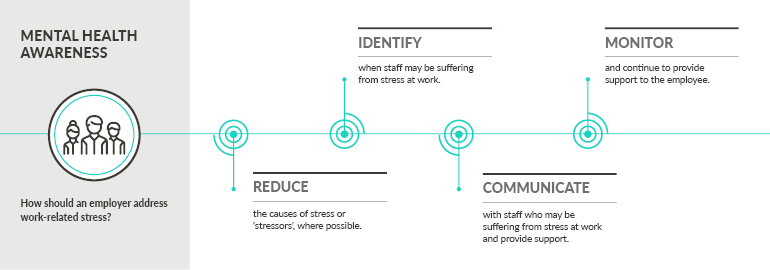Managing Mental Health in the Workplace
Mental health is one of the main causes of absence from work, with 'work-related stress' being cited as the most common mental health condition causing absence. A recent study found that Northern Ireland is the UK region with the highest level of employees who have identified feeling stressed at work (85%).1
It is critical for businesses to ensure they meet their legal obligations and duties towards their workforce, not only to ensure a safe place of work, but also to address underlying mental health conditions from which some staff may suffer.
Employers should also have adequate systems in place to address and manage the impact an employee’s mental health can have on performance, productivity and staff wellbeing.
What does the law state on mental health in the workplace?
Employment legislation places as much emphasis on mental impairments as it does on physical impairments. Many mental health conditions are addressed within the Disability Discrimination Act 1995 (DDA), particularly where the condition has a long-term adverse effect on the employee’s ability to carry out normal day-to-day activities.
Where the condition is protected under the DDA, this will trigger the employer’s duty to make reasonable adjustments to assist the employee, where possible, in carrying out his or her role.
Employees protected under the DDA also have the right not to suffer less favourable treatment on the grounds of disability.
In any event, employers have a legal duty to take reasonable care for the health, safety and wellbeing of staff. This not only applies to employees’ physical safety in work, but also their mental health and wellbeing, as far as possible.
Employers should not only be aware of work-related mental health conditions, like work-related stress or anxiety - but also pre-existing conditions which may be exacerbated by work stressor, such as depression, post-traumatic stress disorder, etc.
Another point to keep in mind is whether side effects from any prescribed medication could impact an employee’s ability to carry out their role or their performance generally. This may require a risk assessment for example, and an awareness of prescribed medication for all employees - which may seem invasive.
How should an employer address work-related stress?
The Health and Safety Executive defines work-related stress as “the adverse reaction people have to excessive pressure or other types of demand placed on them at work."
The common types of 'stressor' include: demands of the job, level of control over work, support from managers and colleagues, relationships at work, or change within the workplace and how that change is managed.

How can employers assist employees with underlying mental health conditions?
It is important that line managers are adequately trained to be able to recognise mental health awareness 'indicators' and to support their team's mental health. Alarmingly, only 40% of UK workers would trust their manager with a mental health concern.2 Trust and communication between line managers and team members is critical when seeking to support staff with underlying mental health (or any health) conditions.
Sourcing a good Occupational Health adviser is another useful way of supporting staff with mental health conditions in the workplace, particularly where the condition is the source of increased absence levels. Occupational Health can provide you with the professional advice on reasonable adjustments that might assist the employee fulfilling their role.
Conclusion
Mental health in the workplace is an area that is often overlooked. However, if not adequately managed or addressed, it will have a negative impact on staff morale and wellbeing, productivity and absence levels. 15.8m working days are lost to mental health illness in the UK and poor mental health could be costing UK businesses up to £42.3 For these reasons alone, it should be a regular item on senior management team agendas.
For more information in relation to this, please contact Jill Gracey, Associate, or another member of our Employment and Incentives Belfast team.
Date published: 14 May 2019








